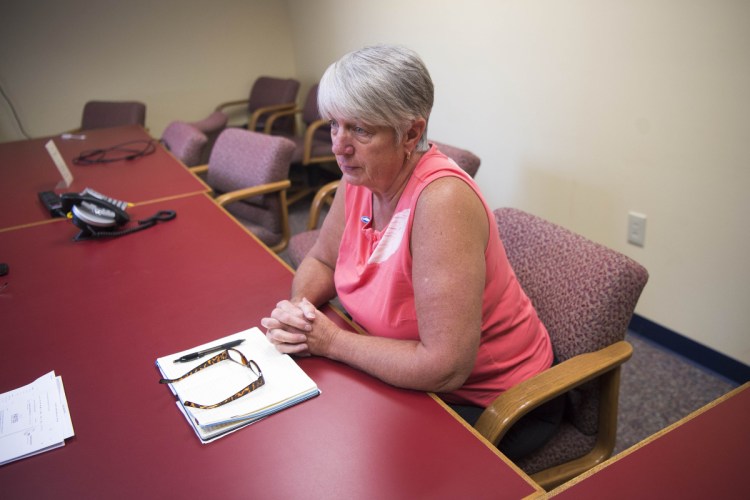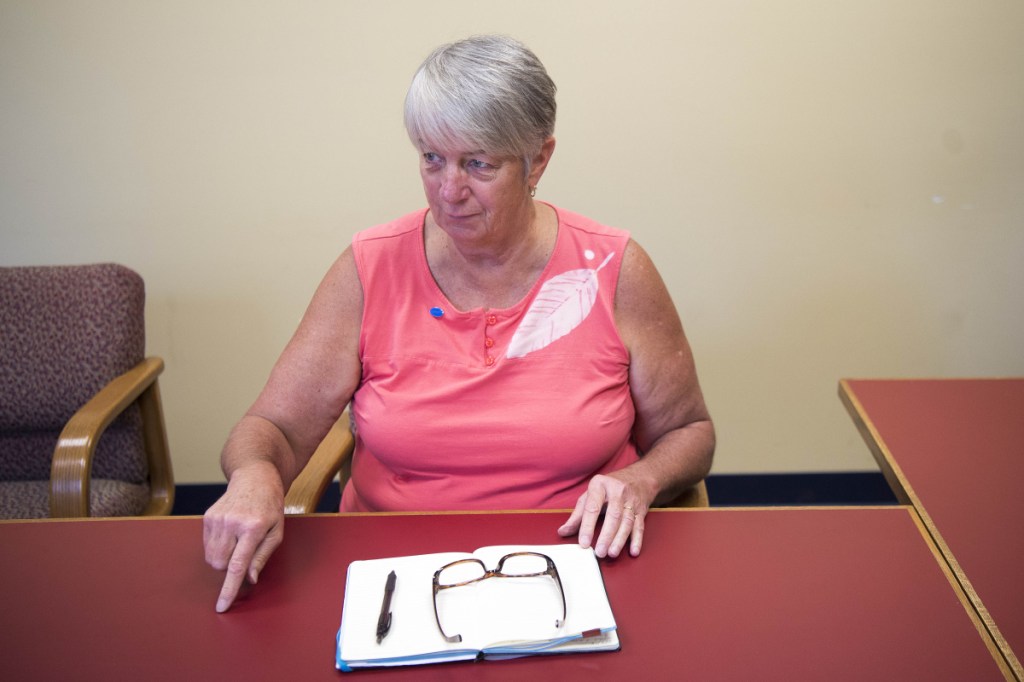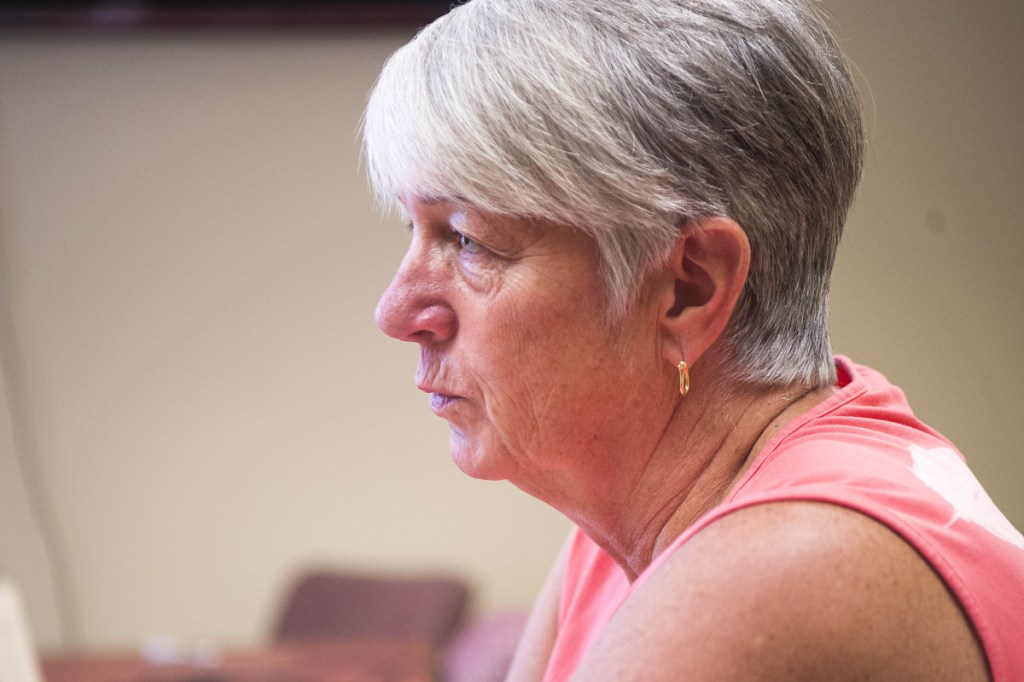WATERVILLE — Terry Hayes vows that if she is elected governor, she will change the tone of state government.
“We need to hit the reset button on the way we treat each other as we do this work,” she said.
The 60-year-old Buckfield resident, state treasurer and former state representative spent part of Friday in Waterville, where she visited Educare Central Maine, an early childhood education center, and spoke with residents and businesspeople.
She also visited the Morning Sentinel, where she spoke about being a Clean Elections candidate who would be the first Clean Elections governor, if elected.
“Money is poison in politics,” Hayes said. “It’s a significant part. It’s not any one person’s fault, but it has become a real part of the problem, and your average voter sees it. They’re the victim of it. The reason it is important to me as a Clean Elections candidate is that I wanted to be able to talk about issues, and I don’t want to be in a room dialing for dollars. I would much rather talk with voters and listen to voters than spend that time on the telephone asking for money.”
Elected state treasurer in 2014, Hayes previously represented part of Oxford County as a Democrat in the Legislature from 2006 to 2014, when she changed to independent and endorsed Eliot Cutler, an unenrolled gubernatorial candidate. Hayes had served as Democratic assistant minority leader in the House after her re-election in 2010.
She said the last six years in state government have been very different from the six years before that “in tone, in inclusion and general respect,” and, as governor, she would work to change that.
“How we’re doing things is awful,” she said. “We have a Legislature that can’t even adjourn. Last year we had a three- or four-day shutdown. For what? We’ve had the executive branch at war with the legislative branch. We can do better than that. Relationships matter in this work. It doesn’t mean you agree with people. I’m not going to hate anybody because of who they voted for.”
Divisive politics has interfered with officials’ ability to get work done, according to Hayes.
“For me, I look at, why has it taken us so long to make significant inroads in the opioid crisis?” she said, adding that much time was spent debating whether access to treatment or law enforcement was the priority.
“We’ve been six years and the numbers get bigger and bigger and bigger,” she said.
Hayes says she wants to make Maine the best state in the country in which to work, and that would include attracting skilled workers from other states and countries.
“We have good-paying jobs throughout the economy, living-wage jobs, opportunities for careers. If we don’t fill those positions, the businesses will relocate. We’ve known about this. We’ve known our demographics are challenging. We’re doing some things, and I want to support efforts underway. How do we make Maine the best state to work in? We need skilled workers in Maine.”
Asked how she would confront people who are anti-immigration in the attempt to draw workers from other countries, Hayes said it is not her intent to confront them.
“But I don’t agree with them,” she said. “I’m not advocating for illegal immigrants; I’m advocating for legal immigrants. These are some of the best-educated, most resourceful people from these cultures to come to Maine. How do we put them to work quicker? I think part of it’s education, part of it is persuasion, but it’s the right thing to do. We can’t survive without it. Our economy won’t.”
Maine has assets that are undervalued and not touted, according to Hayes. People come to Maine in the summer for vacations and love it and the state must be promoted as a year-round place.
“We just have to tell our story better and be more welcoming,” she said.
If elected governor, Hayes, who is married, has three children and holds a bachelor’s in government from Bowdoin College and a Master of Business Administration degree from Thomas College, said that she would ensure bills are paid on time with the state’s money and that the state lives within its means. A former guardian ad litem for children, Hayes said she has had experience working with the state Department of Health and Human Services through different administrations and the judicial branch with child protection and is aware of significant challenges involving children.
“If there’s anything about being governor that will keep me up at night, … I will be responsible for all of the children in foster care,” she said.
Waterville recently ended a contentious budget season that pitted Mayor Nick Isgro and his supporters who advocated for a smaller tax rate increase against city councilors and others who said the budget could not be cut more without significantly affecting departments and personnel. In the end, a budget was approved that increased the city’s tax rate from $23.33 per $1,000 worth of assessed property valuation to $25.27.
Councilors pointed to the fact that Waterville is a service center with a lot of nonprofits that do not pay taxes, a small, 13-square mile area, a population of 16,000 that increases to 35,000 during the daytime when nonresidents use city services, and courts and probation offices that draw people here.
Councilors argued that a big problem with the budget is that the state does not give municipalities the revenue sharing money they are owed and schools are not given the 55 percent funding they are supposed to get.
Hayes said the revenue sharing law was designed to take into account service centers so that they get a bigger piece of the pie.
“I think we should follow the law or change the law,” she said. “I think we need to meet our commitment under the statute or we need to change it.”
As to the 55 percent for education funding, Hayes says it is problematic in two respects: Taxes would have to be raised to meet 55 percent, and that percent itself is nebulous.
“Fifty-five percent of what and who decides the what and what is decided locally?” she said. “I think there’s a better solution out there.”
She suggested repealing the 55 percent — because it will not be met — and discussing possible alternatives such as having a statewide teachers’ contract implemented and controlled by the state.
“I’m offering this as an example of what we might do,” she said.
Hayes is a former educator in Oakland schools and was a member of the School Administrative District 39 board of directors, representing Buckfield. She managed adult education programs in Gardiner and Scarborough and was the first education director of the Maine Real Estate Commission in Augusta.
Amy Calder — 861-9247
Twitter: @AmyCalder17
Send questions/comments to the editors.






Success. Please wait for the page to reload. If the page does not reload within 5 seconds, please refresh the page.
Enter your email and password to access comments.
Hi, to comment on stories you must . This profile is in addition to your subscription and website login.
Already have a commenting profile? .
Invalid username/password.
Please check your email to confirm and complete your registration.
Only subscribers are eligible to post comments. Please subscribe or login first for digital access. Here’s why.
Use the form below to reset your password. When you've submitted your account email, we will send an email with a reset code.